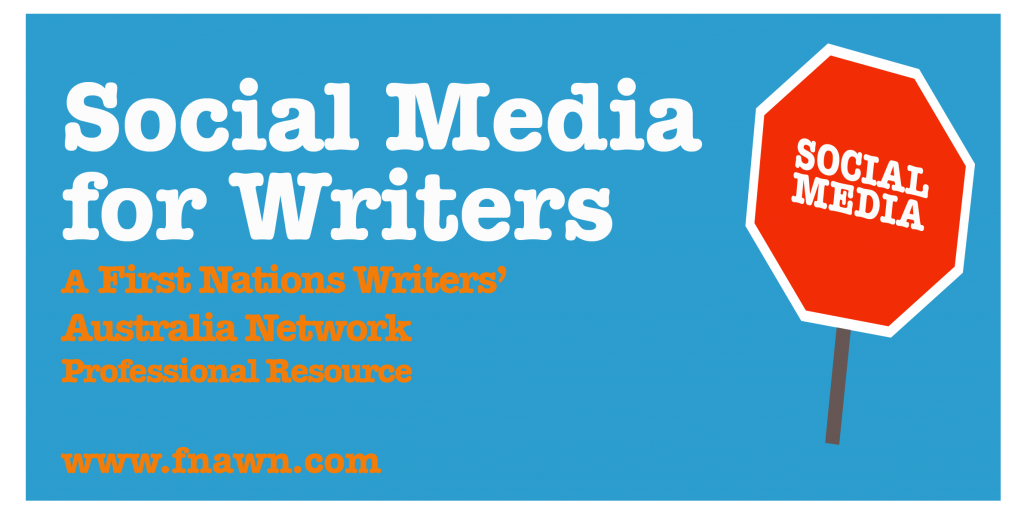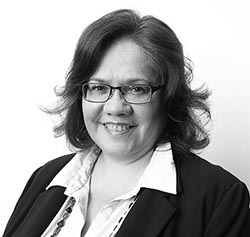 If you”re a writer, most people assume you will be able to understand and manage social media quite easily. While you may be at some advantage, it can still be incredibly confusing. There are so many different types of social media applications – blogs, Facebook, Twitter, Instagram, Tumblr – how do you know which ones you should focus on? And do I really need to be online?
If you”re a writer, most people assume you will be able to understand and manage social media quite easily. While you may be at some advantage, it can still be incredibly confusing. There are so many different types of social media applications – blogs, Facebook, Twitter, Instagram, Tumblr – how do you know which ones you should focus on? And do I really need to be online?
In this series of posts, Leesa Watego from Iscariot Media, will unpack some of the issues, emerging and published writers may have with social media.
 Welcome to the first Professional Resource Series of the First Nations Australia Writer”s Network. My name is Leesa Watego and I”m the owner and director of Iscariot Media. We work on creative, online and educational projects, and we”ve been using social media and digital tools for about 14 years, and if you”ve ever heard of the saying “the only thing in life that”s constant is change”, then you”ll be fine when talking about digital tools, because they are ALWAYS changing. After this series, I hope that you have a better understanding of how you can use digital media, regardless of where you are in your writing career.
Welcome to the first Professional Resource Series of the First Nations Australia Writer”s Network. My name is Leesa Watego and I”m the owner and director of Iscariot Media. We work on creative, online and educational projects, and we”ve been using social media and digital tools for about 14 years, and if you”ve ever heard of the saying “the only thing in life that”s constant is change”, then you”ll be fine when talking about digital tools, because they are ALWAYS changing. After this series, I hope that you have a better understanding of how you can use digital media, regardless of where you are in your writing career.
I always tell my clients the same thing when we start working together, and that is YOU DO NOT HAVE TO USE SOCIAL MEDIA IF YOU DON”T WANT TO. While everyone might be saying to you “Why aren”t you on Facebook?”, you don”t have to do it unless you really want to. Actually, if you don”t want to do it, it”s probably best if you don”t. But, if you want to sell more work, being online might help you out.
So, if you have decided to use social media as a tool in your writer tool-kit, here are some initial ideas to consider:
- Social Media is part of your marketing strategy: If you”re fed up with the thought of using it, ask yourself “how am I using this tool to further my professional standing?” Yes, on Twitter, we will sometimes talk about what we had for breakfast, but more often, we have conversations about work, big ideas and things that are happening in the world. When you join Twitter, join it under your name (the name you”re published under), be yourself, but be mindful that you”re a professional and it is a professional identity that you”re adding to with every 146 characters.
- Social Media helps you engage with your audience: Using a Twitter account and/or Facebook page gives you an opportunity to meet and talk with your audience well after the book signing event is finished. Be interesting and engaging, and your audience will want to be part of your online world. Building an audience will help you when you are looking for support for another project. Are you writing a new work? Why not share the journey with your audience if it”s appropriate? If they”re following you through it”s gestation, they”re more likely to choose to buy when the new work is born. Anita Heiss, during the writing of Tiddas, shared her travels with her Twitter audience throughout the research and writing phase.
- Social Media is a playground to experiment with new ideas: It does seem counterintuitive, but Twitter can be an interesting space for storytelling. Siv Parker earlier this year experimented with using Twitter as a storytelling platform. Her tweet yarn Maisie May, published on the 26 January 2014 on Twitter over the course of 9 hours, was very well received. She discussed the project further at the Digital Writers” Festival in February.
- It”s media you can control: You have little control over the way media will depict you and/or your writing. With social media, you have a degree of control over the message. Your social media channels are the media that YOU own. You release your press releases, publish your opinion and/or commentary, and maybe even set the record straight where controversy has arisen.
- Social Media doesn”t have to control you: We”ve all seen people who seem to be slaves to their smart phones, but it doesn”t have to be like that. You can build an audience that understands that you have a “start” and “end” of each day, and that you have days off. Over time, you can learn to NOT answer every notification that pops up on your screen, and you”ll learn to filter what needs attending to and what you can let go. A great way to ensure social media doesn”t control you is to make sure you don”t sleep in the same room with your phone.
For those of you who are already in the digital space, I hope this post cemented for you why you use social media as a professional tool. For those of you who are just starting out, I hope that you have even just a slightly better understanding of how you can be part of this amazing new tool.
In the next post, we will go through a range of different social media platforms that could be useful for your professional online identity.
If you have an questions, feel free to comment below, or Tweet me.
